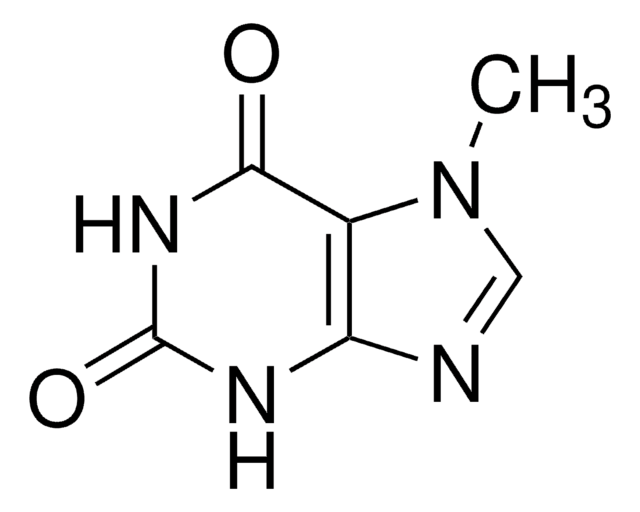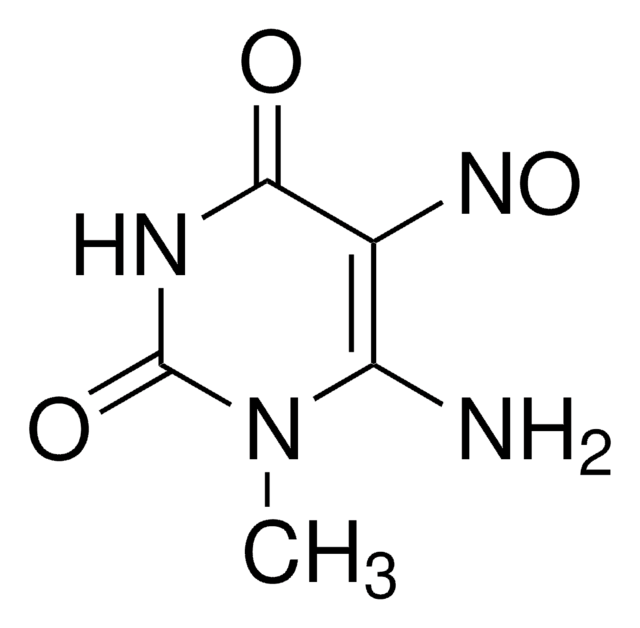222526
3-Methylxanthine
98%
Synonym(s):
2,6-Dihydroxy-3-methylpurine
Sign Into View Organizational & Contract Pricing
All Photos(2)
About This Item
Empirical Formula (Hill Notation):
C6H6N4O2
CAS Number:
Molecular Weight:
166.14
Beilstein:
180944
EC Number:
MDL number:
UNSPSC Code:
12352005
PubChem Substance ID:
NACRES:
NA.22
Recommended Products
Quality Level
Assay
98%
mp
>300 °C (lit.)
SMILES string
CN1C(=O)NC(=O)c2[nH]cnc12
InChI
1S/C6H6N4O2/c1-10-4-3(7-2-8-4)5(11)9-6(10)12/h2H,1H3,(H,7,8)(H,9,11,12)
InChI key
GMSNIKWWOQHZGF-UHFFFAOYSA-N
Gene Information
rat ... Adora1(29290) , Adora2a(25369)
Looking for similar products? Visit Product Comparison Guide
General description
3-Methylxanthine, a metabolite of theophylline, was quantitated in rat plasma by a sensitive LC-MS/MS method.
Storage Class Code
11 - Combustible Solids
WGK
WGK 1
Flash Point(F)
Not applicable
Flash Point(C)
Not applicable
Personal Protective Equipment
dust mask type N95 (US), Eyeshields, Gloves
Choose from one of the most recent versions:
Already Own This Product?
Find documentation for the products that you have recently purchased in the Document Library.
Customers Also Viewed
Sang Won Lee et al.
Biochemistry, 49(13), 2943-2951 (2010-03-11)
RNAs often exhibit a high degree of conformational dynamics and heterogeneity, leading to a rugged energy landscape. However, the roles of conformational heterogeneity and rapid dynamics in molecular recognition or RNA function have not been extensively elucidated. Ultrafast time-resolved fluorescence
H Konishi et al.
European journal of clinical pharmacology, 46(4), 309-312 (1994-01-01)
The effect of fluconazole, an antimycotic that inhibits cytochrome P-450-mediated drug metabolism, on theophylline kinetics and the production of its metabolites were compared with those of enoxacin in 5 healthy subjects. All subjects received a single oral dose of 240
Sandrine Derkenne et al.
Pharmacogenetics and genomics, 15(7), 503-511 (2005-06-23)
Pharmacokinetics of theophylline was investigated in Cyp1(+/+) wild-type mice, Cyp1a1(-/-) and Cyp1a2(-/-) knockout mice, and humanized hCYP1A1_1A2 mice lacking either the mouse Cyp1a1 or Cyp1a2 gene. Animals received a single dose of theophylline (8 mg/kg i.p.), either alone or pretreated
M Sarkar et al.
Antimicrobial agents and chemotherapy, 34(4), 594-599 (1990-04-01)
Some quinolone antibiotics cause increases in levels of theophylline in plasma that lead to serious adverse effects. We investigated the mechanism of this interaction by developing an in vitro system of human liver microsomes. Theophylline (1,3-dimethylxanthine) was incubated with human
M C Rogge et al.
Clinical pharmacology and therapeutics, 46(4), 420-428 (1989-10-01)
The pharmacokinetics of theophylline and its three major metabolites, 3-methylxanthine, 1-methylurate, and 1,3-dimethylurate, were studied during intermittent administration of enoxacin. The addition of enoxacin (400 mg, twice daily) to a theophylline dosing regimen (150 mg, twice daily) resulted in an
Our team of scientists has experience in all areas of research including Life Science, Material Science, Chemical Synthesis, Chromatography, Analytical and many others.
Contact Technical Service








